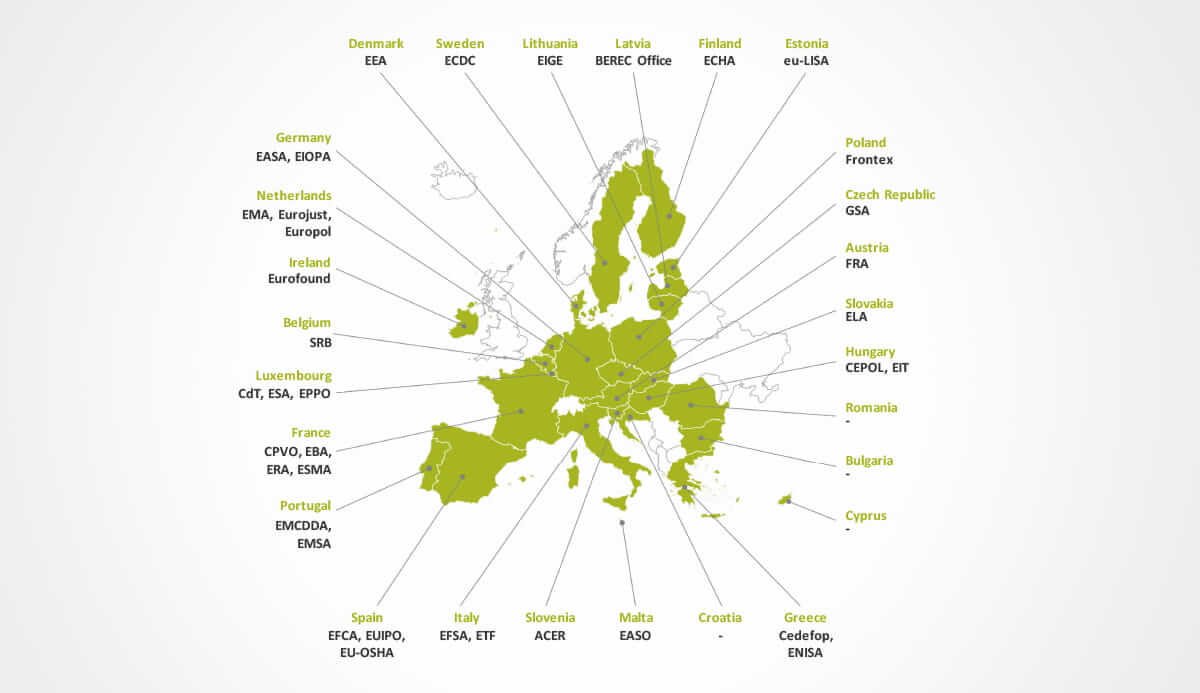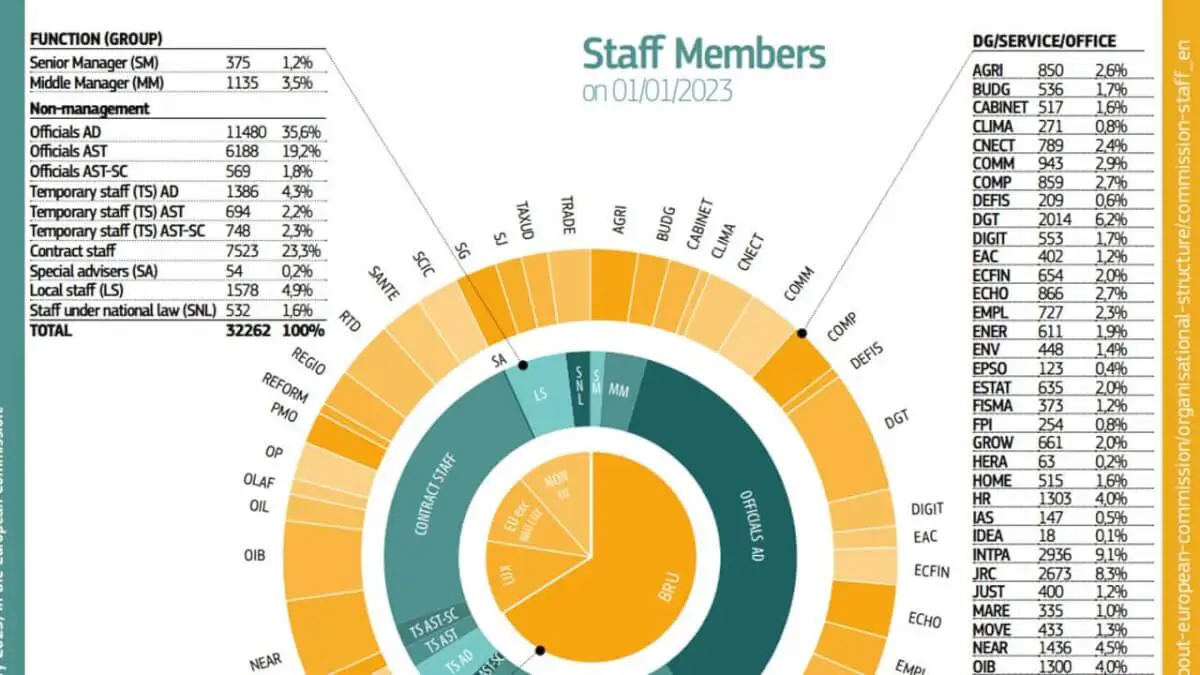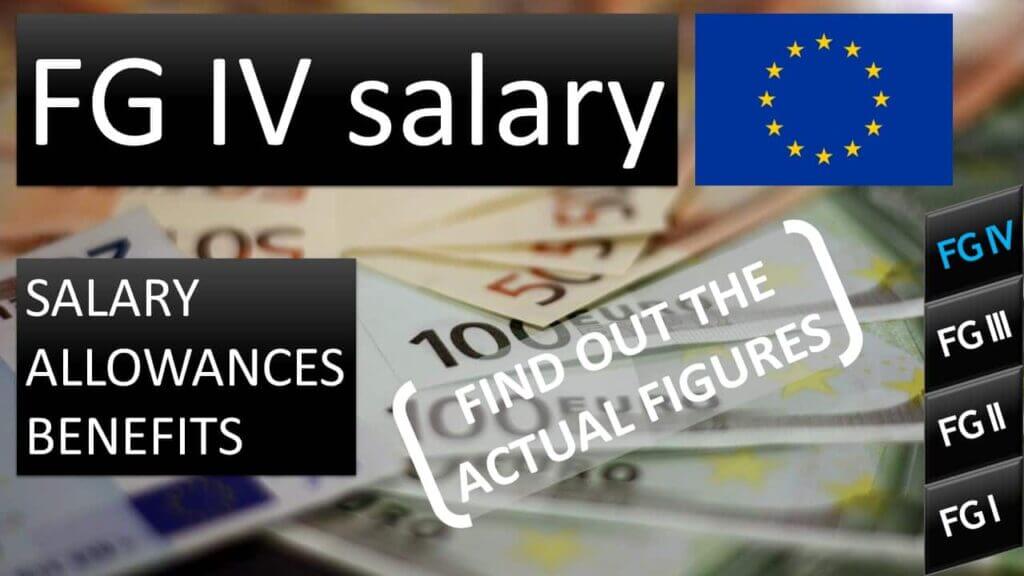Key Takeaways
- EU institutions offer numerous career paths that differ significantly
- Within the same staff category, usually there are different grades and steps correlated with increasing levels of responsibility and pay
- Some staff categories are much easier entry points into EU institutions than others
Most outsiders think about officials working for the European Union institutions as one large clump of ‘civil servants’. However, once someone considers that they might want to “work for the EU”, people are often overwhelmed not only by the number of EU institutions, but by the diversity of staff categories or types.
However, it pays to know your way around this topic to understand not only which institution and which staff category is most appropriate for you, but also which the easiest entry point to start your EU career.

This article will provide a comprehensive overview of all staff categories in EU institutions, required qualifications, as well as advantages and drawbacks of working in that staff category.
We will not cover staff categories that depend on high-level political appointment, such as Commissioners of the European Commission, Judges of the Court of Justice or Members of the Court of Auditors, as these are not available to a regular person.
One important caveat – not all types of employment listed below are “staff of EU institutions” in the legal sense. Only Administrators, Assistants, Secretaries and Clerks, Contract Agents, and Accredited Parliamentary Assistants are ‘statutory staff’ of EU institutions according to the oft cited Staff Regulations. However, we have listed the many more staff categories that you can encounter in the corridors in Brussels or elsewhere to provide a thorough overview and to show the various ways how one can jumpstart his or her career in EU institutions.
I. Administrators
Definition and Responsibilities
Administrators are the highest ‘caste’ of staff working for EU institutions. Being an administrator is widely considered as the most prestigious form of employment and a sign that you’ve “made it” in the EU system.
While administrators on average receive the highest salaries, their work is probably the most stressful one, as it comes with increasing responsibility over policy fields and managing of a growing number of people with each advance in the hierarchy.
As an Administrator, your main duties, which may vary among different institutions, can be divided into three primary areas:
- policy formulation,
- operational delivery,
- resource management.
The starting grade for Administrators is AD 5. While AD 5 is generally advertised as the entry level for university graduates with no professional experience required, in practice it is notoriously difficult to become an Administrator at the European Commission. Very often, even experienced professionals would start at this grade and slowly work their way up.
AD 7 roles are advertised more rarely than AD 5 roles and are usually earmarked for specialists in a policy area. Several years’ relevant experience are required in addition to completed university studies.
AD 9 / AD 12 is middle management level. Selection/recruitment at these grades requires previous management experience.
The highest grades are AD 15 and AD 16, at which point you would be heading at least a Division in a Directorate General or the whole DG.
Administrators are employed by the European Commission, the European Parliament, the European Council, the EU agencies and all other EU institutions.
Administrators are entitled to all the allowances and other benefits of statutory staff of EU institutions.
Overview of Administrators’ salaries by grade
Qualifications and Selection Process
To become an Administrator, typically, you need to be a university graduate at Bachelors level, so at least 3 years of study.
Administrators for the European Commission and most Brussels-based EU institutions are selected through the European Personnel Selection Office (EPSO) ‘concours’ that include several types of tests and assessments.
It is much easier to become an Administrator in one of the 40+ EU agencies as these usually organize their own selection processes with much less competition.
If you’re successful, your name will be placed on a reserve list, and you may be contacted for specific job opportunities within EU institutions.
Advantages and Disadvantages of Being an Administrator
Advantages:
- Job security: EU institutions are known for their stability and job security. Once you become an administrator, you can expect to have a long and stable career, if you stand the drawbacks listed below.
- Competitive salary: Administrators in EU institutions are paid well, with salaries that are comparable to those in the private sector in Western Europe, and above other parts of the European Union.
- Working at the “bleeding edge” of a policy field: Administrators often are responsible for defining legislation and policy for a narrow area, that takes into account the most recent research, scientific and other developments, and is forward-looking.
- Opportunities for growth: EU institutions offer a wide range of opportunities for growth and career advancement. Administrators can move up the ranks and take on more challenging roles.
- International exposure: Work in most EU institutions provides a unique opportunity to work with people from different countries and cultures. If meeting people from different countries and cultures motivates you, consider working for the EU.
- Contributing to the ‘EU project’: The EU institutions are behind many projects that have a significant impact on the EU population and developing countries. This job advantage motivates many EU staff at the start of their careers.
Disadvantages:
- Bureaucracy: If you cannot stand slow processes where procedure is more important than results, you will not like working in most EU institutions’ jobs. Dissatisfaction with ‘red tape’ is one of the main reasons why people leave their well-paid EU jobs.
- Workload: The workload for administrators (and other staff) in EU institutions can be heavy, with long hours before deadlines. Burnout is a reality for many staff members, and the practical experience runs contrary to the image in some media of three-hour-long lunches and Fridays off.
- Language requirements: EU institutions require new administrators to be fluent in at least two EU languages. If you do not pick up the third language at B2 level in 10 years, your contract will be terminated.
- Limited autonomy: Administrators in EU institutions have limited autonomy and must follow strict rules and regulations. There are always multiple layers of management above you and many stakeholders to manage on the ‘outside’.
- Political pressure: Administrators in EU institutions often face political pressure from Commissioners through their Cabinet staff, as well as member states, which can make it difficult to make impartial and evidence-based decisions.
II. Assistants
Definition and Responsibilities
Assistants in EU institutions are generally employed in executive and/or technical roles in areas such as administration, finance, communication, research, and policy development. Their grades range from AST 1 to AST 11.
While the word “Assistant” invokes a perception that this is a staff category closer to secretarial tasks, the reality is far from it. Lower and mid-level secretarial tasks are in fact performed by staff in the categories AST/SC, Contract Agents in function groups FG I and FG II, as well as interims.
As an “Assistant” you can and will in fact have significant responsibilities and manage quite large groups of staff. As an example, IT personnel, audio technicians, and interpreters are very often ‘Assistants’.
The actual importance of the Assistants’ role is underlined by the fact that grades AST 5 up to AST 11 overlap with Administrators’ grades AD 5 – AD 11, with the same salary and benefits.
Assistants are employed by the European Commission, the European Parliament, the European Council, the EU agencies and all other EU institutions.
Assistants are entitled to all the allowances and other benefits of statutory staff of EU institutions.
Overview of Assistants’ salaries by grade
Qualifications and Selection Process
To become an assistant, you must meet certain qualification requirements. Typically, this includes:
- Having an appropriate level of completed secondary education, or equivalent professional experience.
- Proficiency in at least two official EU languages, including your mother tongue.
The selection process begins with an application to the European Personnel Selection Office (EPSO), unless you apply to work for one of the EU agencies, as these organize their own selection competitions.
In the competitions you usually go through general assesment exercises as well as ones linked to your future role.
If you’re successful, your name will be placed on a reserve list, and you may be contacted for specific job opportunities within EU institutions.
Advantages and Disadvantages of Being an Assistant
Advantages:
- Career Progression: Working as an assistant at an EU institution can provide you with valuable experience that may lead to regular advance to higher-level positions within the EU system. Being an assistant increases your chances to become an Administrator, if that’s what you are looking for.
- Job Stability: Assistants have the same level of benefits and job security as Administrators.
- Lower Stress Level: Unless you are an Assistant in the grades AST 8 and higher, you can expect a much lower stress level compared to your Administrator peers in the corresponding grade.
Disadvantages:
- Competition: The selection process can be highly competitive, and securing a position as an assistant might is no easier than getting an AD grade.
- Language Requirements: The need for proficiency in multiple languages can be a barrier for some candidates. To be hired, you need to demonstrate skills in two EU languages, and you will need to master a third EU language to get an indefinite contract that lasts beyond 10 years.
III. Secretaries and Clerks AST/SC 1-6
Definition and Responsibilities
As a Secretary/Clerk within EU institutions, you would belong to the Secretaries and Clerks’ Function Group (AST/SC). This group comprises six grades ranging from AST/SC1 to AST/SC6, who perform clerical and secretarial tasks.
Your main duties would include finalising documents and files, supporting unit or department activities such as meetings and official travel, and compiling and disseminating information through updating databases and files.
Staff in this category are usually supervised by Administrators and Assistants.
Secretaries and Clerks are employed by the European Commission, the European Parliament, the European Council, and some other EU institutions, but very few EU agencies. The EU agencies prefer to use Assistants, Contract Agents in the lower grades and Interims for these duties.
Secretaries and Clerks are entitled to all the allowances and other benefits of statutory staff of EU institutions.
Overview of ‘Secretary and Clerk’ AST/ASC salaries by grade
Qualifications and Selection Process
To qualify for a position as a Secretary or Clerk, you should have a completed secondary education and have previous relevant experience, or hold a relevant vocational qualification.
Recruitment is done through EPSO for most Brussels-based institutions. Very few EU agencies employ staff in the AST/SC category, but those who do run their own competitions for the post.
If you aim for secretarial duties, you should always prefer AST/SC vacancies over Contract Agent posts in grades FG I and FG II, and being an interim. The AST/SC grade offers a significantly higher job security and usually also a higher pay.
Advantages and Disadvantages of Being a Secretary or Clerk
Advantages:
- You would have the opportunity to work in a diverse and multicultural environment, contributing to the efficient functioning of the EU institutions.
- As a Secretary or Clerk, you would be eligible to receive the same benefits as other categories of statutory staff in EU institutions. Your salary will be lower than that of most Administrators and Assistants, but other benefits will be the same.
Disadvantages:
- Since EU institutions have a highly competitive selection process, securing a position as a Secretary or Clerk can be challenging. Consider starting out as an interim, to gain a competitive edge in job competitions.
- As part of your job, you may be required to perform manual tasks, which might not suit everyone’s personal and career preferences.
IV. Accredited Parliamentary Assistants
Definition and Responsibilities
Accredited Parliamentary Assistants (APAs) are a special category of Assistants. They have the same salary and benefits as other colleagues in the AST 1-11 grades, however, their employment period is directly tied to the period the Member of Parliament (MEP) they serve is in office.
If the MEP is not re-elected or ends his/her term prematurely (death, criminal conviction, family care obligations, etc.), the APA’s contract is also terminated, unless the person finds another MEP to serve.
APAs are employed under a direct contract with the European Parliament and are based on the Parliament’s premises, in one of its three places of work – Brussels, Strasbourg, or Luxembourg.
As an APA, your responsibilities typically include:
- Conducting research on policies and legislation
- Preparing briefings and reports
- Communicating with other MEPs, stakeholders, and constituents
- Coordinating meetings, workshops, and events
- Providing administrative support, such as managing calendars and travel arrangements
Overview of Accredited Parliamentary Assistants’ salaries by grade
Qualifications and Selection Process
Accredited Parliamentary Assistants are usually recruited through two channels. Most often one can become an APA if you have known the MEP in his/her “previous life”, and the MEP takes you along as a trusted support staff or adviser. Secondly, you can become an APA to one of the many political groups in the European Parliament. However, you would have to be a truly outstanding professional in a specific field of expertise to be recruited as an outsider, as usually these positions go to persons affiliated with the political parties making up the EP political group.
As most APA positions are at least somewhat dependent on the succesful candidate’s political affiliations, merit plays a lesser role for this staff category, but it doesn’t hurt to have:
- Appropriate educational background and relevant professional experience
- A good understanding of EU policies, legislation, and the political process
- Excellent communication, teamwork, and organisational skills
- Proficiency both in English and French is recommended, although there are plenty of assistants with low to mediocre French language skills
The selection process for APAs is carried out by MEPs, who are responsible for choosing and recruiting them. European Parliament guidelines on how to apply for APA positions are publicly available.
It is common that once an MEP’s term in office nears its end, APAs “jump ship” to more permanent posts in the European Parliament, European Commission or other EU institutions.
Advantages and Disadvantages of Being an Accredited Parliamentary Assistant
Advantages:
- Unique opportunity to work with MEPs and contribute to shaping EU policies
- Exposure to a multicultural and multilingual environment
- Building a strong professional network across European institutions. An APA position can be a springboard to more permanent AST and AD positions.
- Access to continuous learning and development opportunities
- Competitive salary and the same benefits as for Administrators, Assistants and Contract Agents
Disadvantages:
- High workload and pressure to meet tight deadlines, particularly, if you’ve ended up with an ambitious or toxic MEP
- Multitasking and handling diverse tasks may be challenging
- Regular travel between Brussels, Strasbourg, and Luxembourg is usually required
- Contractual nature of employment linked to MEP’s term in office may result in feelings of job insecurity
- Requirement to relocate to Brussels.
V. Contract Agents
Definition and Responsibilities
Contract Agents are just below Administrators and Assistants/APAs on the proverbial “totem pole”, however, in contrast to all other staff categories, Contract Agents are statutory staff of EU institutions. This in practice means that while their salaries are generally lower than in the other two categories, they are entitled to the same allowances, pension rights, and other benefits like JSIS coverage.
While there are four ‘function groups’ of Contract Agents, the main differences are between FG III and FG IVs vs FG I and FG IIs. The former do more of executive tasks, while the latter are usually engaged in secretarial, assistant and manual labour tasks.
| Function group | Grades | Duties |
| IV | 13 to 18 | Administrative, advisory, linguistic and equivalent technical tasks, performed under the supervision of officials or temporary staff. |
| III | 8 to 12 | Executive tasks, drafting, accountancy and other equivalent technical tasks, performed under the supervision of officials or temporary staff. |
| II | 4 to 7 | Clerical and secretarial tasks, office management and other equivalent tasks, performed under the supervision of officials or temporary staff. |
| I | 1 to 3 | Manual and administrative support service tasks, performed under the supervision of officials or temporary staff. |
That being said, being an FG I or FG II clearly beats being an Interim or an Intramuros, because of the increased job security and benefits on top of the salary.
To become a Contract Agent at the European Commission and other mainly Brussels-based EU institutions, you will have to go through the CAST (Contract Agents Selection Tool) procedure managed by EPSO.
If you want to become a contract agent at an EU agency, it is much easier as EU agencies run their own competitions, where there is less competition.
Types of Contracts and Duration
Contractual scenarios for Contract Agents can significantly vary, as described in Articles 85-90 of Staff Regulations. However, here are the main points:
- European Commission and some other EU institutions almost exclusively practice the so-called 3a contracts. This means that a Contract Agent can have two contract periods up to a total of 6 years (for example, 3 + 3 years), after which the working relationship is terminated. Most 3a Contract Agents immediately after hiring look for more permanent positions in EU institutions in Brussels or the many agencies scattered around the EU.
- Most EU agencies and some other EU institutions hire Contract Agents also under the so-called 3b contracts, which can lead to indefinite contracts. 3b Contract Agents are usually initially hired for a shorter period, and then a second period for a total length of 6 years. If a contract is extended for a second time (even if the 6 term is not reached), the 3b ContContract Agent attains an indefinite contract. However, offering of a 2nd contract extension is not automatic.
Overview of Contract Agents’ salaries by grade
Advantages and Disadvantages of Being a Contract Agent
Advantages:
- Opportunity to work in various professional fields within the EU institutions.
- Possibility of renewal for 3b contracts and long-term career development.
- Exposure to a diverse and multicultural work environment.
- Access to a wide network of professionals across Europe.
- Competitive remuneration package and benefits.
Disadvantages:
- Generally lower salary compared to Administrators and Assistants.
- Limited job security due to fixed-term contracts, particularly for 3a Contract Agents in the European Commission.
- Requirement to relocate to the ‘seat’ of your institution.
VI. Seconded National Experts
Definition and Responsibilities
Seconded National Experts (SNEs) are experienced civil servants from EU Member States who “loan” their expertise to the EU for a set period of time, usually for 2-4 years, but not more than 6 in one position.
While it is advertised that SNEs are contracted by EU institutions to provide unique skills, such as technical, security, legal, and financial expertise, in practice SNEs are also often hired as they don’t count toward the staff quota of an EU institution.
Selection Process and Duration
The Seconded National Experts also have a selection process that on the surface resembles selection of statutory staff, but in practice is much easier. It typically involves securing endorsement from your country’s public administration for your application, which you submit to the desired EU institution.
Advantages and Disadvantages of Being an SNE
Advantages:
- Opportunity to broaden your professional experience and acquire new skills by working in an international environment
- Possibility for extra income as many SNEs, particularly from West and Central European countries, get to keep their previous monthly salary while also getting the special SNE allowances
- Possibility to build a strong network within the EU institutions and agencies
- Exposure to the functioning of EU policies and decision-making processes
- Increased chances to get a statutory job position in the EU institution they are seconded to
Disadvantages:
- Limited career advancement opportunities within the EU institutions, as SNEs are not considered permanent staff. To make a career in EU institutions, they have to leave their national administration
- Potential difficulties adapting to different working cultures and administrative procedures
- Temporary nature of the position and lack of long term commitment to the EU institution
Overall, serving as a Seconded National Expert can be a rewarding experience for professionals interested in the EU institutions and policies, offering a unique opportunity to expand their knowledge and skills, though it may not provide the same level of career advancement and job security as permanent staff positions.
VII. Freelance Interpreters / Linguists
Definition and Responsibilities
As a freelance linguist in EU institutions, you will provide high-quality interpretation, written translations and other language-related services such as interpreting and proofreading.
Your work will involve converting speech or text from one to another of the 24 official EU languages, as well as some non-EU languages, ensuring accurate communication between the different EU institutions and their stakeholders.
Qualifications and Selection Process
To become a successful freelance linguist, you should have a strong educational background in languages and translation or interpreting.
Proficiency in at least two languages is a minimum requirement, but most often fluency in at least three languages is required.
The selection process for freelance linguists may involve responding to call for tenders or contract notices, which vary depending on the EU institution. You can also be subcontracted by a company that bids or has one an interpretation or translation contract with one or several EU institutions.
For example, the European Commission and the Court of Justice have specific channels for prospective freelance translators and interpreters. Once selected, you may be required to undergo further training or testing to meet the quality standards expected by the EU institutions.
One of the EU institutions that regularly hires freelance translators is CDT, the Translation Centre for the Bodies of the EU. CDT application procedure for freelance translators. Freelance interpreters are also regularly hired by other institutions that are part of the European Commission, the European Parliament, the Court of Justice. Google “freelance interpreter” + “name of the desired EU institution” and you’ll find plenty of opportunities.
Advantages and Disadvantages of Being a Freelance Linguist
Advantages:
- Flexibility: As a freelancer, you can manage your time and workload according to your availability and preferences. This allows you to balance work and personal life more efficiently.
- Diverse work opportunities: Working with EU institutions offers a wide range of assignments and projects, exposing you to different topics and fields, keeping your job challenging and interesting.
- Networking: Interacting with professionals from various sectors helps you expand your professional network and discover potential job opportunities.
- Higher than average hourly or daily rates, and coverage of mission expenses (accommodation, travel, daily allowance).
Disadvantages:
- Lack of stability: Freelance work may not always be steady, with periods of infrequent or no assignments, impacting your income stability. This was especially evident during the SARS-CoV-2 pandemic.
- Limited benefits: As a freelancer, you do not have access to the same benefits as full-time staff, such as paid leave, health insurance or pension contributions.
- High competition: Both within and outside EU institutions, the freelance linguist market is competitive, requiring consistent effort to maintain your relevance, networking and securing new projects.
Ultimately, being a freelance linguist in EU institutions can be a rewarding career pathway, offering flexibility and diverse work experiences. However, it also comes with certain challenges, such as income stability and competition in the market.
Many freelance linguists set out as independents, and then take the necessary steps to become permanent staff of EU institutions.
VIII. Interims
Definition and Responsibilities
Interim staff are temporary employees working for EU institutions to cover short-term staffing needs. Do not confuse interims with Temporary Agents, which is a sub-type in the Administrator staf category.
Interims are often needed in secretarial and usher roles, providing support for permanent staff and ensuring that projects and tasks are carried out efficiently and effectively. As an interim, your responsibilities may vary depending on the position and the EU institution you work with.
The smaller the EU institution you will work for, the higher the chance that you will be asked to perform tasks with greater responsibility.
I have a dedicated article about interims to find out more about this staff category.
Qualifications and Selection Process
To become an ‘interim’ in an EU institution, you never apply directly. Interims are “loaned” to EU institutions by the so-called temping agencies, which have one a tender with an EU institution and provide temporary staff for a fixed amount of time while the contract is in force.
The selection process for interims has several stages. At first, they are whetted by the ‘temping’ agency, to ensure that they satisfy a certain professional profile and skills level. Once interims are shortlisted and offered to an EU institution, they are also interviewed and sometimes even tested by this institution.
Advantages and Disadvantages of Being an Interim
Advantages:
- Being an interim is a good way how to ensure income if you are between jobs
- Main benefit of being an interim is that it can serves as a springboard to secure a permanent job in an EU institution
- It is a possibility to network to facilitate your chances of being hired for a more stable contract in an EU institution
Disadvantages:
- Interim roles are temporary in nature and do not offer the same job security as permanent positions.
- The pay is usually quite low and allows you to pay for necessities, but not more
- If you are an interim in Belgium, you will have to take a month off after working for 5 months even if an institution wants to employ you for a longer period
- There is no career progression for interims
- Interims do not have the same staff protections as regular staff of EU institutions, as they legally are employees of the ‘temping’ agency.
IX. Intramuros (External Consultants)
Definition and Responsibilities
‘Intramuros’ (from Italian ‘intra muros’ or within walls of the city) consultants, also known as external consultants, are regular or short term staff of the various consultancies and other companies that provide services to EU institutions within their premises, as opposed to “extra muros” who don’t regularly enter premises of institutions.
Intramuros are included in this article as a separate staff category because, while they as individuals have no contractual relationship themselves with the EU institution, they can spend substantial amounts of time in the EU institution’s headquarters or a field location and spend long stretches of time along other categories of EU staff.
This begs the question –
What is the difference between ‘intramuros’ and ‘interims’? Interims are hired to replace missing or not-yet-hired staff in EU institutions or provide support to statutory staff. Intramuros are experts in their field that have been contracted through a company to provide additional services to EU institutions to implement a specific project or reach an objective. This is a subtle difference that explains why pay between interims and intramuros can differ by a factor of 3 or more.
Examples of tasks intramuros might perform for an EU institution at its premises:
- Setting up of IT systems software and hardware
- Advisers in a policy field
- Strategy development
- Management of complicated or technical projects
- Regular and digital communications
- Webmasters, administrators of websites
Qualifications and Selection Process
You can become an intramuros if the company you work for wins a tender procedure advertised by an EU institution. However, very often companies might bid for EU institutions’ tenders and only in case of success look for qualified professionals. This is so because most normal businesses can’t afford to keep staff on payroll in case a large EU project comes along.
The vacancy announcements that are frequently seen on LinkedIn usually mention not only the expertise required, but the fact that you’ll be hired by business X, but work in the premises of EU institution Y. The work location is usually Brussels, Luxembourg or Strassbourg, but can also be a location in another EU member state.
If you are thinking about working for the EU, an intramuros role can be a good way to observer the work reality of statutory EU staff as an outsider, but getting as close as possible to the natural habitat of ‘EU officials’.
Advantages and Disadvantages of Being an Intramuros Consultant
Advantages:
- Flexibility
- Good pay, often better than the EU staff you’ll be working with
- Work on large scale systems or an important EU project implementation
- You are not bound by bureaucracy and politics (at least not as much as your fellows in statutory staff roles
Disadvantages:
- Work engagements are usually limited in time from a few months to a few years
- While your salary might be higher than that of EU staff you work along with, you’ll notice that they have a number of allowances and benefits in addition to job and income security
- Your work and ability to deliver might still be affected by slow or inefficient decision-making at the contracting authority
X. Trainees (Stagiaire)
Definition and Responsibilities
As a trainee (or ‘Stagiaire’ in French) in an EU institution, you will have the opportunity to gain valuable experience and enhance your skills within a multinational setting. All EU institutions offer paid internships, usually, with the same rate.
Traineeships, often referred to as internships, provide a unique chance to contribute to the work of the EU and learn about its various policies and processes.
Landing a good traineeship is a lottery. You could be assigned to do meaningful work for your EU institution. But you could just as well be relegated to copying papers for meetings.
Types of Traineeships and Duration
EU institutions have several traineeship programmes. The European Commission runs it’s Blue Book Traineeship programme. As a Blue Book trainee you have a chance to work not only for the many DGs or Directorates-General, but also for EU agencies and other EU institutions that don’t run their own traineeship programme.
The European Parliament has its Schuman traineeships.
EU institutions can also run their own traineeship programmes without fancy names of the programmes above.
All EU trainees receive a stipend that is called either a ‘grant’ or an ‘allowance’. European Commission trainee’s allowances are around 1350 EUR, while the European Parliament pays its Brussels-based trainees 1521 EUR each month.
The trainee’s allowances are adjusted by the Correction Coefficient just like EU officials’ salaries and allowances. In the below table you can get an idea what you trainee allowance might be if you work outside Brussels, for example, for an EU agency.

Traineeships usually last for 6 months. If your performance has been good, you could be offered to extend the traineeship by your institution to another 5 months.
Traineeships cannot be extended for longer than 11 months, but you can apply for several traineeships at different institutions.
If you didn’t like the official European Commission video above, here’s a more authentic video about the experience of one trainee in an EU institution in Luxembourg.
Magda also has a nice video about how to survive on the trainee allowance in Lux.
Advantages and Disadvantages of Being a Trainee
Advantages:
- Gain practical experience in a diverse and international environment
- Enhance your CV and increase your employability
- Expand your professional network
- Improve your language skills
- Trainees get an allowance
- Traineeship can be a springboard to a more permanent EU job
- Some traineeships help you to qualify for the EU Junior Professionals Programme
Disadvantages:
- Highly competitive application process
- Plane in preferred EU institution is not guaranteed
- Trainee allowance is very modest and requires ascetic living
- In most cases, requires short-term relocation to the country of your EU institution
Frequently Asked Questions
Staff Regulations apply only to statutory staff of EU institutions: Administrators, Assistants (also Accredited Parliamentary Assistants and Secretaries and Clerks) and Contract Agents.
Such categories as Seconded National Experts and Interims are not covered by the Staff regulations.
No. EPSO is used as the exclusive manager of hiring for the European Commission and some other Brussels-based institutions.
Many EU institutions such as EU agencies can choose whether to use EPSO procedures or select staff by themselves. Agencies most often choose to run their own employee selection procedures.








5 responses to “Staff Categories Working for EU Institutions: A Guide”
awesome
Hello,
Thank you for this article.
I applied for some positions at EU institutions. Despite having professional experience in the field that I applied to, I was not successful.
Do you consider that a traineeship at an EU institution could increase the probability of being selected for other positions?
Thank you
Yes, traineeships and even being an interim greatly increase your chances of being hired. While being an intern or trainee you should actively network. Also – you’ll intimatelly know what the institution needs. It’s quite frequent that former trainees and interims get selected, if they apply for a competition/ vacancy announcement, as they have already proven themselves as a good fit for the institution. However, I hope that you can survive on the trainee’s stipend or the low interim’s salary.
Thank for your answer.
You mentioned that it cab be valued for the organisation where the traineeship occured.
Usually, organisations do not consider relevant an traineeship on a different agency, for example?
Thank you
Hi! A traineeship in a different organisation will still be valued. However, it’s important that the skills are relatable to the institution you’re aplying at. For example, if you were a stagiaire in a policy unit at the Fundamental Rights Agency in Vienna, then your experience might be less relatable to Europol, unless there’s a position with a clear human rights profile. However, if you were a trainee in a communications unit, these skills might count as equally valuable in a different institution’s communications unit/division.
Additionally, the fact that you’re a “known quantity” for people in an agency where you were a trainee will usually not transfer to another agency. Your best course of action would be include a reference person in your application form and CV. You might even go as far as ask for a general recommendtation letter from your traineeship supervisor or head of sector / unit and include that in the application form.